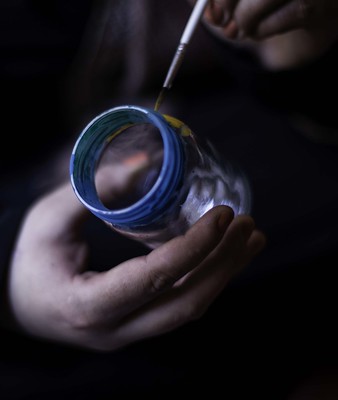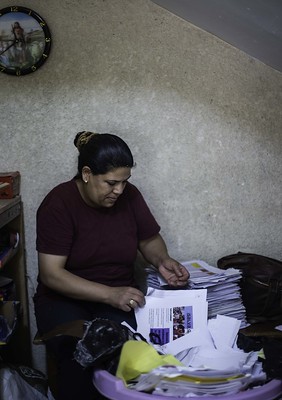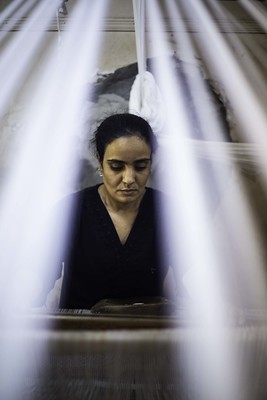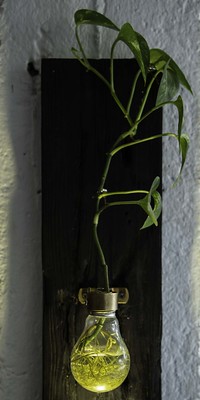re‹think the way we use resourcesRecycling began in our mothers’ kitchens

“I felt that I could do something important.”
Egyptian mothers used to recycle garbage and leftover products in the past, especially during the two world wars. Warfare left little material resources for the civilian population, and it became necessary for most homes to recycle their waste.
Although the wars are long ago, a new generation earns a living from recycling, spreading awareness about recycling to safeguard the environment.
One of them is a housewife, Basma, who is 28 years old. She never studied art, but she observed how her mother would reuse the thrown away items. Following her lead, Basma collected anything she was able to decorate. “When I finished my first product, I felt that I could do something important. This makes me happy, and I have the courage to teach my child how to make things before throwing them in the garbage,” she says.
For years, waste, which has been a problem for contemporary Egyptian society, has become the focus of many investors, who have woken up to the economic and environmental importance of recycling and converting waste into raw materials. These are used in many industries and are even exported. It is estimated that the volume of waste in Egypt amounts to around 22 million tonnes annually, and less than 20 pecent of this is appropriately disposed of or recycled.
Greater Cairo (Cairo, Giza, Qalyubia), and Alexandria generate almost half of the country’s municipal solid waste created per year.
“Papers can produce hundreds of things that we never even imagined.”
Nour Ataya, 44 years old, holds a wall frame that she made from recycled paper. When she was young, she worked with her father, a rubbish collector. She was one of many a Zabbaleen, which means “garbage people” in Egyptian Arabic. “I didn’t continue my education in school because I had to help my father. Now I hope my children will go to school. That is the difference between two generations: We are thinking more about our children’s future,” says Nour.
Most Zabbaleen children lack access to formal education. Schools, until relatively recently, were not a feature of the garbage settlements, and even young children worked with their parents, either sorting waste or helping on the collection routes.
Historically, the Zabaleen were farmers from Assiut in Upper Egypt who migrated to Cairo in the 1940s to escape poor harvests. The Wahiya, people from Egypt’s Western Desert, asked the Zabaleen to join them in Cairo’s garbage-collection trade, who have successfully carved out a niche for themselves.
Since the 1940s, hundreds of women have been raised in the Zabbaleen community and helped their families collect garbage.
Over 20 years, the Association for the Protection of the Environment (APE) has worked with Egypt’s Zabaleen. They run workshops supporting and teaching women how to recycle different materials.
Hyena Abide is 36 years old and works as a carpet maker at APE, recycling fabric leftovers. “I’ve worked here for 20 years, and I hope to take a break because my work is very difficult. Although, I like the part where I arrange different colours of fabric,” she says.
“It is possible to turn anything that has no value into something beautiful.”
Sanya Saliebis is 55 years old and has four children. She has worked in recycling for 20 years. “I make handmade products from recycled materials. For instance, I use the soft drink cap to make belts and bags,” she says.
Today, the centre teaches more than 250 young women how to sort, design, cut, sew, weave, iron, and recycle these fabrics into patchwork quilts, bedspreads, rugs, bags, and other marketable items. After the women finish the workshop, they can work from home.
“People can use their creative skills to find ways to craft beautiful objects from waste and earn some extra cash.”
Inside the Gezazy gallery, Asmaa Farouk started a recycling project with her husband as a family business. “When my husband Mohamed worked in Marsa Allam, he witnessed the considerable waste consisting of glass bottles. In this period, he wanted to arrange workshops for Bedouin people, but he couldn’t. At the beginning of our project, my family worried about the new project because we had left our jobs. Now though, we have three workshops, all working on different concepts,” she says.










